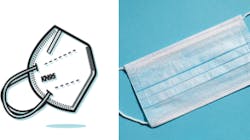Thursday Troubleshooter: Dental team member does not feel safe using same 2 masks all day
QUESTION: The oral surgeon I work for gives each team member two masks every morning. One is a KN95 mask from China and one is a regular blue mask, not a surgical mask. I do not feel safe wearing the same mask all day for all surgeries. Is this even allowed? The dentist also doesn’t wear a mask around us out of the surgery room and he does not practice any social distancing. Help!
ANSWER FROM KAREN DAW, “The OSHA Lady”:
It sounds like there are two concerns here.
In an oral surgery setting, as in any other setting that requires personal protective equipment (PPE), the employer must conduct a hazard assessment and then provide PPE based on the hazards. In addition, the Occupational Health and Safety Administration (OSHA) requires the employer to certify each employee on PPE. This is because the employer is required to provide PPE necessary to protect employees on the job.
Currently, oral surgery practices often use N95 and other similar respirators due to the generation of aerosols and emergency cases with COVID-positive patients. However, the COVID-19 pandemic has increased the demand for traditional N95 respirators. Therefore, the Food and Drug Administration (FDA) issued an Emergency Use Authorization (EAU) letter that permits alternative respirators, including some KN95s, for health care. In addition, the Centers for Disease Control and Prevention (CDC) and National Institute for Occupational Safety and Health (NIOSH) issued guidelines that permit the extended use of respirators. Per the CDC, if a respirator is not available, the highest level of mask and a full-length face shield can be substituted.
The bottom line is yes, you can use the same two masks all day, as long as the respirator maintains its structural and functional integrity and the filter material is not damaged, soiled, or contaminated. In addition, the employer must include in the written or Respiratory Protection Plan (RPP) the circumstances under which a respirator will be considered contaminated and not available for extended use or reuse. Extended use is preferred over reuse due to contact transmission risk associated with the donning and doffing process.
But (there’s always a big but!), extended use of facemasks and respirators should only be undertaken when the facility is at “contingency” or “crisis” capacity. This means there is indeed a shortage and the practice has exhausted reasonable avenues to procure the PPE. In addition, all applicable administrative and engineering controls must be implemented.
Per the CDC, these controls include “selectively canceling elective and nonurgent procedures and appointments for which PPE is typically used by dental health-care providers. Extended use of PPE is not intended to encourage dental facilities to practice at a normal patient volume during a PPE shortage, but only to be implemented in the short term when other controls have been exhausted. Once the supply of PPE has increased, facilities should return to conventional strategies.” (Visit cdc.gov/coronavirus/2019-ncov/hcp/dental-settings.html) PPE should be covered in the practice’s annual OSHA and COVID-19 infection control training.
Now for your second point—a doctor who is either not aware of, has become lax with, or does not care to follow the regulations and recommendations. Regardless of which one it is, you can address your concerns with the doctor and request some updated training. Hopefully, he understands that building a culture of safety involves leading by example. Print and share the CDC’s current recommendations for dentistry, which currently include social distancing and using face coverings even when not engaged in patient care.
If your message is ignored your options include filing a formal complaint with OSHA, and in some states with the dental board. There’s also the possibility of working at another practice. There are so many doctors who are doing everything to protect their team and patients. You are entitled to a workplace that is free from hazards. Period. The options are numerous, but the bottom line is that you have choices. Good luck!
To read previous Troubleshooters, visit DentistryIQ and search “Thursday Troubleshooter.” And remember! If you’re having problems in your dental practice, send your question and concerns to Troubleshooter for an expert to address. You’ll be helping others who are experiencing similar issues. Send inquiries to [email protected].About the Author
Team Troubleshooter
This column features questions from everyday people who work in dental practices, who have issues they would like addressed by the experts. It no longer runs regularly, but the questions sent in the past still apply to dental practices today. Search "Troubleshooter" on DentistryIQ to read more.
